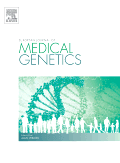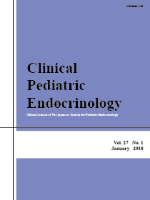
CLINICAL DYSMORPHOLOGY
metrics 2024
Connecting researchers and clinicians in the study of dysmorphology.
Introduction
CLINICAL DYSMORPHOLOGY, published by Lippincott Williams & Wilkins, is a pivotal journal in the fields of anatomy, genetics, and pediatric health, with a significant focus on the study of congenital disorders and their phenotypic manifestations. Established in 1992, this esteemed journal has contributed valuable insights into the understanding of dysmorphic syndromes and their clinical implications, making it an essential resource for researchers, clinicians, and students alike. With an impact factor indicative of its robust scholarly influence, CLINICAL DYSMORPHOLOGY engages a diverse readership through specialized articles, case studies, and reviews that advance the knowledge of genetic conditions and associated anatomical anomalies. Although it operates under a non-open access model, the journal is highly regarded with a 2023 ranking of Q3 in Anatomy and Q4 in several other relevant categories, reflecting its ongoing commitment to quality research in the domain of clinical medicine. Researchers and professionals are encouraged to contribute to and explore the rich content of this journal as it continues to shape the discourse in dysmorphology and related fields until its expected convergence in 2024.
Metrics 2024
 0.19
0.19 0.40
0.40 0.60
0.60 33
33Metrics History
Rank 2024
Scopus
IF (Web Of Science)
JCI (Web Of Science)
Quartile History
Similar Journals

Human Genome Variation
Innovating the Future of Genetic ResearchHuman Genome Variation, published by SpringerNature, is an esteemed open access journal dedicated to the field of genetic research and exploration. Since its inception in 2014, the journal has been at the forefront of advancing our understanding of human genome diversity and its implications in health and disease. With an E-ISSN of 2054-345X, it features a diverse array of studies that encompass biochemistry, genetics, and molecular biology, making it an invaluable resource for researchers and professionals alike. The journal holds a Q3 ranking in both biochemistry and genetics, and a Q4 ranking in molecular biology, highlighting its growing influence within these disciplines. As the landscape of genomics continues to evolve, Human Genome Variation serves as a platform for the dissemination of high-quality research, fostering collaboration and innovation within the scientific community. Researchers and academics are invited to contribute to this pivotal journal, which not only provides open access to its content since 2014 but also aims to bridge the gap between basic research and clinical applications in genetics.

NATURE MEDICINE
Catalyzing Change in Healthcare through High-Impact FindingsNATURE MEDICINE, published by NATURE PORTFOLIO, is a premier journal in the fields of medicine and biochemistry, recognized for its rigorous peer-review process and high-impact research contributions. With an impressive Scopus ranking placing it in the top percentile—#3 out of 636 in General Medicine and #2 out of 221 in General Biochemistry, Genetics, and Molecular Biology—it embodies excellence and innovation in biomedical science. The journal has been a vital source of cutting-edge discoveries since its inception in 1995, and it encompasses a wide range of topics including clinical research, translational medicine, and advances in genetic technologies. The journal’s impact factor reflects its significance, making it an essential resource for researchers, professionals, and students aiming to stay at the forefront of medical science. Though the journal follows a subscription model, it remains crucial for disseminating pivotal research findings that shape the future of healthcare and therapeutic strategies worldwide.

EUROPEAN JOURNAL OF HUMAN GENETICS
Connecting Researchers in the Field of Human GeneticsThe EUROPEAN JOURNAL OF HUMAN GENETICS, published by SpringerNature, stands as a preeminent platform in the field of genetics and clinical genetics. Established in 1993, this prestigious journal, with an ISSN of 1018-4813 and an E-ISSN of 1476-5438, has consistently maintained its position in the Q1 quartile for both Genetics and Clinical Genetics categories as of 2023, reflecting its significant contributions to the field. Its impact is further underscored by its impressive Scopus rankings, placing it in the 92nd percentile among clinical genetics journals. The journal aims to disseminate cutting-edge research, case studies, and reviews that advance our understanding of human genetics, promoting collaboration and innovation among researchers, professionals, and students alike. While it does not currently offer open access, the journal provides substantial value through its rigorous peer review process and commitment to quality. As it continues to shape the future of genetic research through 2024 and beyond, the EUROPEAN JOURNAL OF HUMAN GENETICS remains an essential resource for those dedicated to exploring the complexities of human heredity.

AMERICAN JOURNAL OF MEDICAL GENETICS PART C-SEMINARS IN MEDICAL GENETICS
Unlocking the Secrets of Genetic Disorders.AMERICAN JOURNAL OF MEDICAL GENETICS PART C-SEMINARS IN MEDICAL GENETICS is a premier peer-reviewed journal published by Wiley, focusing on the intricate and evolving field of medical genetics. With its ISSN 1552-4868 and E-ISSN 1552-4876, the journal has established itself as a significant resource for researchers, professionals, and students alike, addressing cutting-edge developments in genetic research and clinical practice. Ranked in the top quartile (Q2) in both Genetics and clinical Genetics categories for 2023, it maintains an impressive Scopus ranking, positioning it within the 75th and 71st percentiles for Medicine and Genetics respectively. The journal encourages open access to its content, promoting wider dissemination of knowledge and fostering collaboration among medical genetics experts. From its inaugural issues in 1980 to its ongoing publications, the journal aims to bridge the gap between genetics research and its clinical applications, providing insights that reflect the latest advancements in the field. As it continues to serve the global medical community, the AMERICAN JOURNAL OF MEDICAL GENETICS PART C remains a vital source for those seeking to understand the complexities of genetic disorders and their implications for health and disease.

European Journal of Medical Genetics
Unlocking Genetic Secrets for Better Health OutcomesEuropean Journal of Medical Genetics, published by Elsevier, is a pivotal platform dedicated to advancing knowledge in the fields of medical genetics and its clinical applications. With an ISSN of 1769-7212 and an E-ISSN of 1878-0849, this journal fosters innovative research and insights into the genetic factors that influence human health. Ranked in the Q3 category for both Genetics and Clinical Genetics, and achieving notable recognition in Medicine (miscellaneous) with a Q2 positioning, it strives to bridge the gap between laboratory findings and clinical practice. Operating in an Open Access format, the journal aims at maximally disseminating essential findings to researchers, professionals, and students alike, ensuring that critical advances in genetics are accessible to the global medical community. With converged publication years spanning from 2005 to 2024, the journal strengthens its mission to be at the forefront of genetic research that informs clinical methodologies and fosters improved healthcare outcomes.

Case Reports in Perinatal Medicine
Advancing knowledge in perinatal care.Case Reports in Perinatal Medicine is a premier academic journal dedicated to the dissemination of knowledge and research in the specialized field of perinatal medicine. Published by WALTER DE GRUYTER GMBH, this journal serves as a critical resource for healthcare professionals, researchers, and students focused on the complexities of perinatal care, maternal health, and neonatal outcomes. The journal aims to foster the exchange of innovative case reports and clinical insights that advance the understanding of perinatal conditions, ultimately contributing to improved patient care and outcomes. While it offers a robust platform for research dissemination, Case Reports in Perinatal Medicine is characterized by its rigorous peer-review process, ensuring high-quality submissions. Subscribe to enhance your expertise in this vital area of medical science and to stay abreast of the latest developments in perinatal research.

Clinical Pediatric Endocrinology
Illuminating the path to better health for children with metabolic disorders.Clinical Pediatric Endocrinology is a prestigious journal dedicated to advancing the field of pediatric endocrinology, published by the Japanese Society of Pediatric Endocrinology. With a respectable ISSN 0918-5739 and E-ISSN 1347-7358, this journal serves as a critical platform for innovative research spanning various aspects of endocrine disorders in children, including diabetes and metabolic conditions. Although it does not currently offer open access, it remains highly relevant in its category, being ranked in Q4 and Q3 tiers across multiple specialties as of 2023. With a publication history that spans from 1992 to 2024, this journal has contributed significantly to the literature, as evidenced by its inclusion in prominent databases. It invites submissions from researchers and practitioners worldwide, aiming to facilitate knowledge sharing and improve clinical practices in pediatric endocrinology. For those dedicated to enhancing care outcomes in children with endocrine disorders, Clinical Pediatric Endocrinology provides essential insights and fosters a community of engaged professionals.

CLINICAL GENETICS
Transforming genetic research into clinical practice.CLINICAL GENETICS is a premier journal in the field of genetics, published by Wiley, and is renowned for advancing the understanding of genetic disorders and their clinical applications. With a notable impact factor and ranking in the top quartile (Q1) in both general genetics and clinical genetics as of 2023, this journal is instrumental for researchers, professionals, and students seeking to explore groundbreaking studies and developments in genetics. Since its inception in 1970, CLINICAL GENETICS has continued to publish high-quality, rigorously peer-reviewed research that pushes the boundaries of knowledge in clinical genetics. The journal maintains a strong reputation in its field, currently holding significant positions in Scopus rankings, including 30th out of 99 in clinical genetics, underscoring its relevance and impact in the field. For those interested, the journal's website provides comprehensive access options for current and archived research, making it an essential resource for anyone involved in genetic research and its clinical application.

Case Reports in Pediatrics
Advancing Pediatric Knowledge Through Unique Case Reports.Case Reports in Pediatrics is a distinguished journal dedicated to the publication of high-quality case reports that illuminate specific pediatric clinical challenges and advancements. Published by HINDAWI LTD, this journal has established itself as an essential resource in the field of pediatric medicine, offering an open-access platform since 2011 to ensure that researchers, healthcare professionals, and students have unrestricted access to valuable insights. With an ISSN of 2090-6803 and an E-ISSN of 2090-6811, the journal aims to foster knowledge exchange and further the understanding of pediatric healthcare practices. This publication not only encourages the sharing of unique and rare case studies but also promotes best practices and innovative methodologies. In a rapidly evolving field, Case Reports in Pediatrics serves as a vital tool for professionals seeking to enhance patient care and inform clinical decision-making.

JOURNAL OF PEDIATRIC ENDOCRINOLOGY & METABOLISM
Empowering Knowledge for Young LivesThe JOURNAL OF PEDIATRIC ENDOCRINOLOGY & METABOLISM, published by Walter de Gruyter GmbH, is a reputable peer-reviewed journal dedicated to advancing the field of pediatric endocrinology and metabolism. Since its inception in 1985, this journal has become a vital resource for professionals and researchers, providing insights into the latest advancements, clinical practices, and foundational research in the care of children with endocrine disorders. With a noted Q3 ranking in Endocrinology, Diabetes and Metabolism, and a robust focus on Pediatrics, Perinatology, and Child Health, it addresses important topics such as hormonal imbalances and metabolic syndromes in young populations. Despite its non-open access status, it continues to play an essential role in bridging the knowledge gap within our understanding of children's health and disease, contributing significantly to the progress in this specialized field.